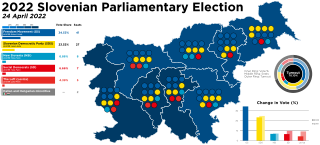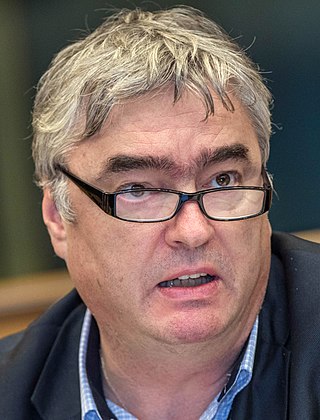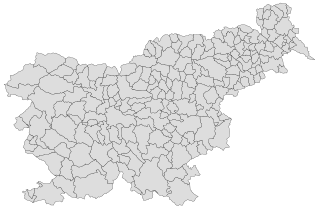The politics of Slovenia takes place in a framework of a parliamentary representative democratic republic, whereby the Prime Minister of Slovenia is the head of government, and of a multi-party system. Executive power is exercised by the Government of Slovenia. Legislative power is vested in the National Assembly and in minor part in the National Council. The judiciary of Slovenia is independent of the executive and the legislature. Slovenia is a Member State of the European Union and is represented in the Council of the EU and through elections to the European Parliament.

The Slovenian Democratic Party, formerly the Social Democratic Party of Slovenia, is a conservative parliamentary party; it is also one of the largest parties in Slovenia, with approximately 30,000 reported members in 2013.

The Slovenian People's Party is a conservative, agrarian, Christian democratic political party in Slovenia. Formed in 1988 under the name of Slovenian Peasant Union as the first democratic political organization in Yugoslavia, it changed its name to Slovenian People's Party in 1992. On 15 April 2000, it merged with the Slovene Christian Democrats to form the SLS+SKD Slovenian People's Party, and changed its name in 2001 to Slovenian People's Party.

New Slovenia – Christian Democrats is a Christian democratic and conservative political party in Slovenia. Since 2018, it is led by Matej Tonin. The party was formed on 4 August 2000 following a split in the unified Slovenian People's Party and Slovene Christian Democrats (SLS+SKD). NSi is a member of the European People's Party (EPP) and in the European Parliament its MEP Ljudmila Novak sits with the European People's Party Group.
The Party of Slovenian People is an extra-parliamentary party in Slovenia. In the 2008 legislative election in Slovenia, the party won 0.25% of the popular vote and no seats in the National Assembly. In the early election on 4 December 2011, the party won 0.09% of the vote, thus not gaining any seats in the National Assembly. The party won 0.4% of the vote in the European Parliament election on 25 May 2014, failing to gain any seats.

Parliamentary elections were held in Slovenia on 4 December 2011 to elect the 90 deputies of the National Assembly. This was the first early election in Slovenia's history. The election was surprisingly won by the center-left Positive Slovenia party, led by Zoran Janković. However, he failed to be elected as the new prime minister in the National Assembly, and the new government was instead formed by a right-leaning coalition of five parties, led by Janez Janša, the president of the second-placed Slovenian Democratic Party. The voter turnout was 65.60%.

Parliamentary elections were held in Slovenia on 13 July 2014 to elect the 90 deputies of the National Assembly. The early election, less than three years after the previous one, was called following the resignation of Alenka Bratušek's government in May. Seventeen parties participated, including seven new parties, some of which formed only months before the election took place. Party of Miro Cerar (SMC), a new party led by lawyer and professor Miro Cerar, won the election with over 34% of the vote and 36 seats. Seven political parties won seats in the National Assembly. Three political parties left the Assembly, including Zoran Janković's Positive Slovenia, the winner of the 2011 election, and the Slovenian People's Party, which failed to win a seat for the first time since the first elections in 1990. A leftist United Left party entered the Assembly for the first time, winning six seats.

2014 European Parliament elections were held in Slovenia on 25 May 2014. It was the first in the series of three elections held in the 2014, and the major test leading up to the parliamentary elections in July. The political atmosphere was in a crisis that started with the fall of Borut Pahor's government, then Janez Janša's government in 2013, the latter coming after Janša was accused of corruption. The cabinet of Alenka Bratušek was breaking up, as the former leader of the Positive Slovenia Zoran Janković, who was under the suspicion of corruption, announced his candidature for party president, even though the coalition parties threatened to leave the government if he was to be elected, which later he was.
In the run up to the 2018 Slovenian parliamentary election, various organisations carry out opinion polling to gauge voting intention in Slovenia. Results of such polls are displayed in this article.

Parliamentary elections were held in Slovenia on 3 June 2018. The elections were originally expected to be held later in June 2018, but after the resignation of Prime Minister Miro Cerar on 14 March 2018 all parties called for snap elections. They were the third consecutive snap elections after 2011 and 2014.

Presidential elections were held in Slovenia on 22 October 2017. Nine candidates ran in the first round of the elections, in which the incumbent independent President Borut Pahor placed first and Marjan Šarec of the List of Marjan Šarec (LMŠ) placed second. No candidate received a majority of the vote in the first round, resulting in a run-off between Pahor and that was held on 12 November 2017. Pahor won the run-off with 53% of the vote; voter turnout in the second round was 42.13%, the lowest in any presidential election since independence.
In the run up to the 2022 Slovenian parliamentary election, various organizations carried out opinion polling to gauge voting intention in Slovenia. Results of such polls are displayed in this article. The date range for these opinion polls are from the 2018 Slovenian parliamentary election, held on 3 June, to the present day. The next parliamentary election was held on 24 April 2022.

Parliamentary elections were held in Slovenia on 24 April 2022 to elect all 90 members of the National Assembly.

2019 European Parliament elections were held in Slovenia on 26 May 2019.
The Freedom Movement is a social-liberal political party in Slovenia. It was founded on 26 January 2022, as the successor of the extraparliamentary Green Actions Party (Z.DEJ). At the January congress, Robert Golob was elected as the party's first president and the party received its new identity and name.
The European Parliament election is set to take place in June 2024. This article lists national polls for the European Union (EU) election as well as EU-wide seat projections and popular vote estimates.
In the run-up to the next Slovenian parliamentary election, various organisations carry out opinion polling to gauge voting intention in Slovenia. Results of such polls are displayed in this article.

The 2022 Slovenian local elections were held 20 November (1st) and 4 December. Mayors of all 212 municipalities and members of municipal councils were elected.
The Democrats is a Slovenian political party founded by Anže Logar, a long-time member of the Slovenian Democratic Party (SDS) and former foreign minister. The party's founding congress took place on 16 November 2024 in Maribor, where Logar was elected president of the party.

















